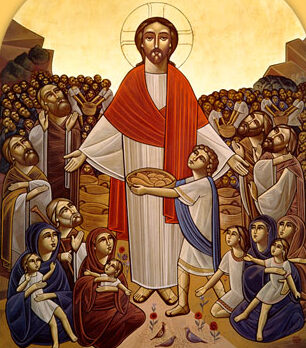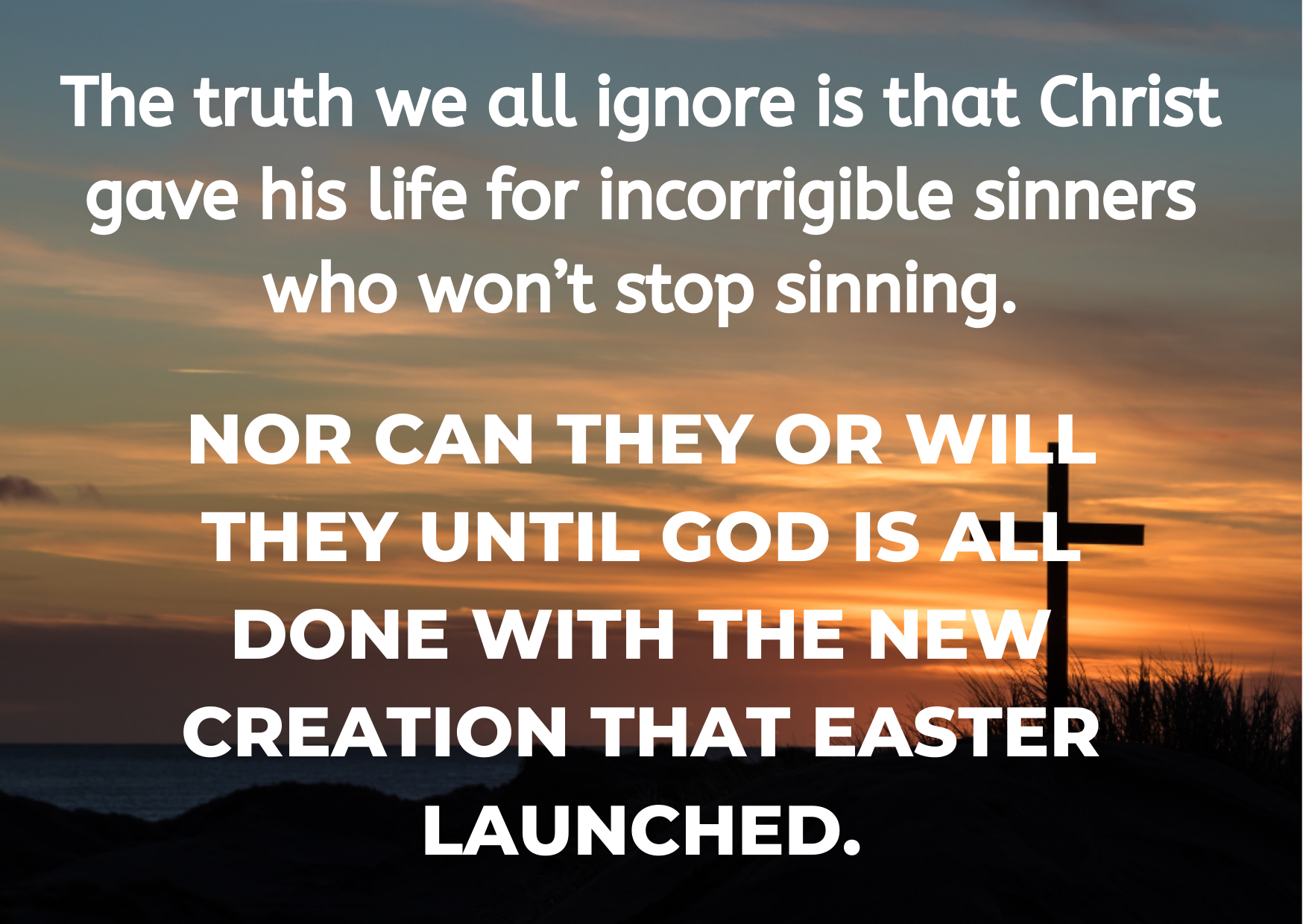Co-missioners,
Our editor ran across another article this week that he wants to tell you about.
We also pass along that our next post will reach you on August 24th. Those responsible for getting them to you will be busy next week with our annual board meeting.
Peace and Joy,
The Crossings Community
__________________________________________________________________
A Refreshing Dose of Public Honesty
by Jerome Burce
I preached on Sunday for the fourth time since retiring a year ago. For me the process of developing a sermon is a mystical sort of thing. I tend to land in places I wasn’t aiming for when I tapped out the first sentence or two of the eventual manuscript.

Christ feeding the multitude
From Wikimedia Commons
Sunday’s effort with the feeding of the 5,000 (Matt. 14) emerged as an underscoring of God’s astonishing compassion in Christ for undeserving critics. Food for everybody, not excepting the ones who have just spent the day griping about the long-winded preacher. Food for you, for me, notwithstanding the number of times we found God wanting last week and beefed about it. Don’t be afraid to admit this, I said. You can count on God’s compassion for undeserving you. You can rely on it even when God catches you in a rebellious hissy-fit over his generosity toward undeserving others. You’re sure to succumb to such fits this week. Judgmental sinners—that’s all of us—do this as a matter of course. Try this week to notice when a fit comes on. If you do, when you do, remember the cross. Remember the One who hung there, and why he hung there, and for whom he hung there. Take courage in him. Fess up to your rebellion. Enjoy his compassion all over again. Excuse his compassion for others. Better still, say “Thank you!”
Not where I thought I was going when I started working on the sermon, but there it wound up. I’m glad it did.
+ + +
Speaking of undeserving critics:
Crackling judgment is a feature of American life today. It pervades the American church. In some parts of the church, it’s out in the open. In others it simmers under a veneer of proffered acceptance—“inclusion,” to use the word du jour. It doesn’t take long to discover that most every church exhibits a set of cultural, moral, and theological assumptions that it expects participants to embrace. It also signals its disapproval of people who fail to embrace them. This can happen with snarls. It can also happen with whispers and insincere smiles. The latter can be especially annoying. Covert legalists are still legalists, as ensnared in the preening, dismissive habits of opinio legis as the blunt ones are. To hear them be honest about this would be oddly refreshing.

Myrtle Beach South Carolina November 24, 2015. Matthew Trudeau Photography from Murrells inlet , USA, CC0,
From Wikimedia Commons
I found a huge dose of such refreshment in The New York Times on Sunday when I got home from church. It gushed from a remarkable column by David Brooks, the likes of which I haven’t seen for a very long time, if ever. Brooks, a fervent Never-Trumper, was addressing the great fault line that runs through our country between his ilk, its progressive wing in particular, and the Trumpian conservatives. This same fault line runs right through the middle of the American church. Few are the ELCA pastors who voted for Trump in 2020, or so I’m guessing. Equally few are the LCMS pastors who voted for Biden—again, a guess.
The incorrigible habit of the like-minded when discussing this divide among themselves is to wonder what’s wrong if not defective about “those people.” Brooks takes a different approach. He asks his people, fellow members of the elite meritocracy that runs the country, to wonder what’s wrong with “us.” What emerges is a thoughtful, perceptive nostra culpa—our fault. It’s the closest thing to a public confession that any of us are likely to encounter these days. It bears close reading, especially by those of us whose favored color is blue.
A few passages to whet your appetite—
In [the story we tell], we anti-Trumpers are the good guys, the forces of progress and enlightenment. The Trumpers are reactionary bigots and authoritarians. Many Republicans support Trump no matter what, according to this story, because at the end of the day, he’s still the bigot in chief, the embodiment of their resentments and that’s what matters to them most.
I partly agree with this story, but it’s also a monument to elite self-satisfaction.
So let me try another story on you. I ask you to try on a vantage point in which we anti-Trumpers are not the eternal good guys. In fact, we’re the bad guys.
Again—
…The educated class lives in a world up here and everybody else is forced into a world down there. Members of our class are always publicly speaking out for the marginalized, but somehow we always end up building systems that serve ourselves.
The most important of those systems is the modern meritocracy. We built an entire social order that sorts and excludes people on the basis of the quality that we possess most: academic achievement.
And again—
Like all elites, we use language and mores as tools to recognize one another and exclude others. Using words like “problematic,” “cisgender,” “Latinx” and “intersectional” is a sure sign that you’ve got cultural capital coming out of your ears. Meanwhile, members of the less-educated classes have to walk on eggshells because they never know when we’ve changed the usage rules so that something that was sayable five years ago now gets you fired.
And there is more—much more than I dare to reproduce here. I can’t urge you enough to go to the source and read the whole thing. Carefully. Penitentially. The title of the piece: “What If We’re the Bad Guys Here?” The word “prophetic” is used too often and usually badly. Here it applies. Real prophets don’t carp about other people. Instead they speak tough truth to their own people. You’ll catch that genuine prophetic ring in Brooks’s conclusion:
As the sociologist E. Digby Baltzell wrote decades ago, “History is a graveyard of classes which have preferred caste privileges to leadership.” That is the destiny our class is now flirting with. We can condemn the Trumpian populists until the cows come home, but the real question is: When will we stop behaving in ways that make Trumpism inevitable?
+ + +
Comes the great embarrassment we Christians need to face. We have no business wallowing in the slop of disdain that fouls our civic life, yet wallow we do. Whether red or blue, we assert that Jesus died for all because all are sinners and only in him can be found the righteousness God craves. Or so we say. In practice we modify this. “Jesus died for repentant sinners,” where “repentance” signifies your adoption of my stances, my values—my perceptions of what God expects or wants of us all. If you line up with me on the issues of the day, I’ll deem you righteous. If not, go chatter your teeth in the outer darkness where you belong.
The truth we all ignore is that Christ gave his life for incorrigible sinners who won’t stop sinning. Nor can they or will they until God is all done with the new creation that Easter launched. Meanwhile we get to embrace the freedom of fessing up to our own incorrigibility without fear of God’s reprisal or the neighbor’s contempt. We also get to practice the divine madness of crediting the righteousness of Christ to every person we encounter with no exceptions—least of all an exception for those who post the wrong sign in their yards when the next election rolls around.
What would the church look and sound like, I wonder, if the Holy Spirit magnified this madness in every baptized heart? What would our country look like?
It’s certainly something to pray for these days.
Thursday Theology: that the benefits of Christ be put to use
A publication of the Crossings Community




You must be logged in to post a comment.